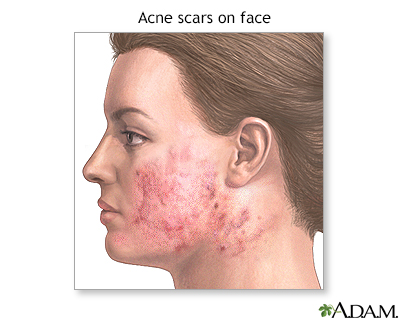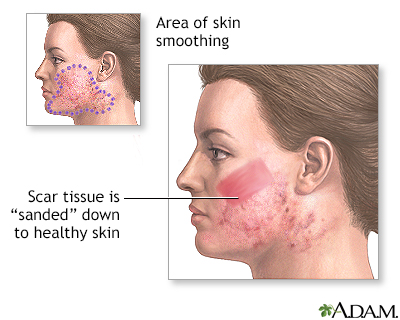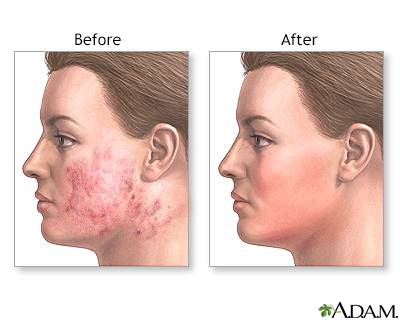Skin smoothing surgery
Indication
|
|
Dermabrasion may be offered to patients with:
- Facial scars from acne, accidents, and previous surgery
- Fine facial wrinkles, such as around the mouth
- Precancerous growths (keratoses)
|
Procedure
|
|
Dermabrasion is usually done while you are awake. You will receive local anesthesia. This means the doctor will numb the area to be worked on.
A surgical instrument is used to gently and carefully "sand" the scar tissue off down to normal, healthy skin. The healing tissue is treated with ointments (such as petroleum jelly or antibiotic ointments) to reduce scab formation (crusting) and therefore reduce scar formation.
|
Aftercare
|
|
The skin may be treated with ointment and a wet or waxy dressing. After surgery, your skin will be quite red and swollen. Eating and talking may be difficult. You may have some aching, tingling, or burning for a while after surgery. Your doctor can prescribe medicine to help control any pain.
Swelling usually goes away within 2 to 3 weeks. New skin starts to itch as is grows. If you had freckles, they may temporarily disappear.
If the treated skin remains red and swollen after healing has started, this may be a sign that abnormal scars are beginning to form. Talk to your doctor. Treatment may be available.
The new layer of skin will be a little swollen, sensitive, and bright pink for several weeks. Most patients can go back to normal activities in about 2 weeks. You should avoid any activity that could cause injury to the treated area. Avoid sports that involve balls, such as baseball, for 4 to 6 weeks.
Protect the skin from the sun for 6 to 12 months until your skin coloring has returned to normal.
|

Review Date:11/30/2022
Reviewed By:Ramin Fathi, MD, FAAD, Director, Phoenix Surgical Dermatology Group, Phoenix, AZ. Also reviewed by David C. Dugdale, MD, Medical Director, Brenda Conaway, Editorial Director, and the A.D.A.M. Editorial team.
The information provided herein should not be used during any medical emergency
or for the diagnosis or treatment of any medical condition. A licensed medical professional
should be consulted for diagnosis and treatment of any and all medical conditions. Call 911
for all medical emergencies. Links to other sites are provided for information only -- they
do not constitute endorsements of those other sites. © 1997-A.D.A.M., Inc. Any duplication or distribution of the information contained herein is strictly prohibited.
The Agency for Health Care Administration (Agency) and this website do not claim the information on, or referred to by, this site is error free. This site may include links to websites of other government agencies or private groups. Our Agency and this website do not control such sites and are not responsible for their content. Reference to or links to any other group, product, service, or information does not mean our Agency or this website approves of that group, product, service, or information.
Additionally, while health information provided through this website may be a valuable resource for the public, it is not designed to offer medical advice. Talk with your doctor about medical care questions you may have.



